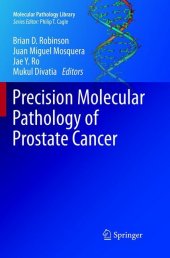 Neuerscheinungen 2019Stand: 2020-02-01 |
Schnellsuche
ISBN/Stichwort/Autor
|
Herderstraße 10
10625 Berlin
Tel.: 030 315 714 16
Fax 030 315 714 14
info@buchspektrum.de |

Mukul Divatia, Juan Miguel Mosquera, Jae Y. Ro, Brian D. Robinson
(Beteiligte)
Precision Molecular Pathology of Prostate Cancer
Herausgegeben von Robinson, Brian D.; Mosquera, Juan Miguel; Ro, Jae Y.; Divatia, Mukul
Softcover reprint of the original 1st ed. 2018. 2019. xiv, 570 S. 2 SW-Abb., 48 Farbabb., 53 Farbtabell
Verlag/Jahr: SPRINGER, BERLIN; SPRINGER INTERNATIONAL PUBLISHING 2019
ISBN: 3-319-87721-6 (3319877216)
Neue ISBN: 978-3-319-87721-1 (9783319877211)
Preis und Lieferzeit: Bitte klicken
This volume focuses on our current understanding of the molecular underpinnings of prostate cancer and their potential application for precision medicine approaches. The emergence and applications of new technologies has allowed for a rapid expansion of our understanding of the molecular basis of prostate cancer and has revealed a remarkable genetic heterogeneity that may underlie the clinically variable behavior of the disease. The book consists of five sections which provide insight about the following: (1) General principles; (2) Molecular signatures of primary prostate cancer; (3) Molecular signatures of advanced prostate cancer; (4) Key molecular pathways in prostate cancer development and progression; (5) and Precision medicine approach: Diagnosis, treatment, prognosis. Precision Molecular Pathology of Prostate Cancer is an important resource for the practicing oncologist, urologist, and pathologist, and will also be useful for researchers in the prostate cancer community.
Part I. General principles.- Approach to patient.- Etiology.- Precursor and pre-invasive lesions of prostate cancer.- Prostatic adenocarcinoma: morphologic spectrum, Gleason scoring, etc.- Genetic susceptibility.- DNA damage repair, BRCA mutations, DNA adducts, SNPs.- Racial differences.- Cancer stem cells Part II. Molecular signatures of primary prostate cancer.- SNPs.- Copy number variation/chromosomal aberration (PTEN deletion, etc.).- Gene fusions (TMPRSS2:ERG, etc.).- Gene expression arrays.- Next generation sequencing (point mutations, indels, etc.).- Epigenetic changes (chromatin remodeling, etc.).- Proteomics.- Metabolomics.- miRNA and lncRNA Part III. Molecular signatures of advanced prostate cancer.- Lymph node metastasis.- Bone metastasis a.- RANKL, Src kinases, endothelins, bisphosphonates.- Visceral metastasis a.- Role of extracellular matrix, angiogenesis, epithelial-mesenchymal transition (EMT), inflammation.- Castration resistant prostate cancer (CRPC).- Neuroendocrine prostate cancer (NEPC) Part IV. Key molecular pathways in prostate cancer development and progression.- Androgen receptor in carcinogenesis.- Androgen receptor in progression (CRPC).- PI3K/Akt/mTOR/PTEN and ERK/MAPK pathways.- Cell cycle regulators (p53, etc.).- DNA damage repair.- Tyrosine kinase signaling (EGFR, VEGFR, PDGFR, FGFR, IGFR, etc.).- Cytoskeletal function (microtubules and taxane therapy) Part V. Precision medicine approach: Diagnosis, treatment, prognosis.- Molecular diagnosis.- Molecular imaging.- Molecular prognostic markers/tests.- Molecular targeted therapies.- Towards molecular classification of prostate cancer.
Brian D. Robinson, MD
Weill Cornell MedicineNew York, NYUSA


